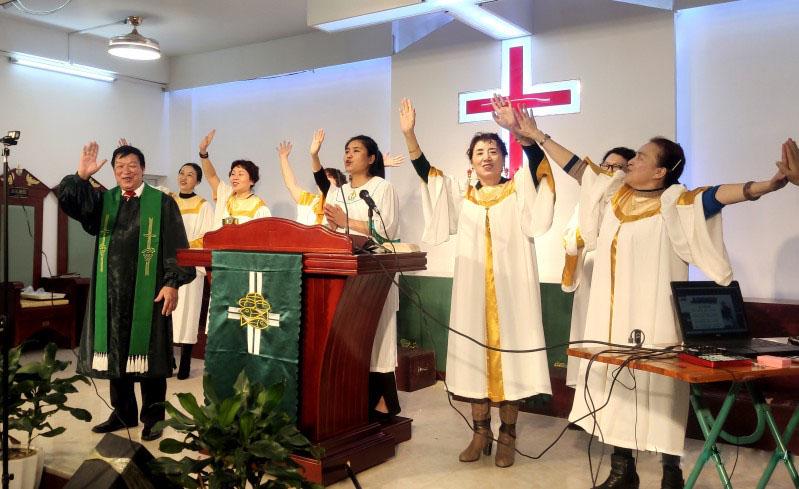“For our church's live broadcast services after the suspension of in-person meetings amid COVID-19, I summed up the following point: renewal and renewal again; preparation and preparation again.” This was what a pastor from Beihai Church in the Guangxi Zhuang Autonomous Region summarized about his church's online pastoral care after the second pandemic wave.
Since the second pandemic wave at the end of January, after all on-site gatherings were cancelled, Beihai Church explored online pastoral care with its own characteristics, and gradually improving, renewing, and preparing before resuming in-person meetings on March 28.
Based on last year's online pastoral experience, Beihai Church found that there was no sense of presence and ritual for believers when worshiping through pre-recorded audio and video, so they decided to adopt live online meetings. Staff in charge of the online ministry looked for some online platforms, such as Tencent Meetings and Nails, but after testing, the results were not satisfactory, so they finally found a public platform: Cloud Church, which has advantages of both live streaming and the ability to watch the playback three minutes after the live broadcast. Cloud Church is a very good life tool mobile software, believers can understand and use all kinds of pastoral care knowledge.
The church has four worship services on Sundays, including local languages (Cantonese) and Mandarin. To meet the needs of the believers who cannot watch due to various reasons such as eyesight, the live broadcast, audio, and video recording were completed at the same time. Therefore, the office staff in charge of the online ministry have a hard time. For the four meetings, they need to collect all the audio and video recordings in advance.
In response to the various situations where some elderly people do not know how to use smartphones or do not have smartphones, and some cannot access the Internet to attend church directly, the church has prepared some QR codes for them so that when their family members, such as children, are around, they can scan the codes with their cell phones for the elderly to listen to the video at any time.
Instead of setting up a cell phone stand in the office and having one person speak in it, the online meetings, especially the fellowship events, have a breakthrough in format. The church's saxophone band, for example, is taught directly in their WeChat group by the church's professional teachers, and then the band students practice and interact with each other. The teacher demonstrates a sample through video on WeChat, and then the students follow it. When students play the saxophone with the wrong mouth shape or wrong fingering, the teacher corrects them immediately, and everyone progresses quickly.
This epidemic has also allowed the church to count believers. In January this year, Beihai Church began to require all online congregations to register with their real names, and almost all believers have now done so. The advantages of the real-name system are first, to know the true information of believers; second, to understand the structure and status of believers; third, to facilitate activities according to fellowships and groups, including distributing gifts, communion, etc.; and fourth, to meet the requirements of the religious authorities for the statistics of believers.
Last year when the epidemic hit Beihai Church, communion was stopped because of the suspension of meetings. Faced with this year's situation, they have purchased more than 5,000 disposable communion cups, and the church's communion team is responsible for preparation. The specific practice is that both communion wine and bread are put into small disposable cups, and whoever wants to receive them signs up in advance and goes to the group leader by real name in the fellowship or group. Other believers who are not in fellowships or groups will be notified by the church on the internet or by phone.
In the various fellowships and groups of Beihai Church, the church has started to use WeChat or QQ for online pastoral care depending on the number of people, such as WeChat meetings, WeChat videos, etc. At present, QQ is more convenient to use, which allows dozens of people to watch live-streaming video where there is pastoral care, sharing and interaction.
According to Beihai Church, online pastoral care has an advantage, which is that it is no longer limited by geographical restrictions or church space. Beihai Church is a 100-year-old church with a small chapel, and the maximum capacity of each meeting is about 350 people. But the webcast has no problem in accommodating more than hundreds of people in one meeting, and the number of people in the four Sunday meetings is also not a problem.
The second advantage is that it allows believers to receive pastoral care visually, with rich graphics, audio, and video. And you can play it back afterward if you find it very helpful. This is more convenient than onsite church gatherings where you cannot "play it back", and you can send the video to people in need and post it on your WeChat Moments.
The disadvantages are that online pastoral care lacks the more solemn, holy, or reverent atmosphere of the chapel, and can only be used as a supplement to offline meetings in the future; some sacraments, such as Holy Baptism, major festive celebrations, etc., cannot be conducted online; and there is a lack of face-to-face communication between preachers and believers, brothers and sisters.
(The writer of this article is a staff writer for The Gospel Times.)
- Translated by Wylie Sun












